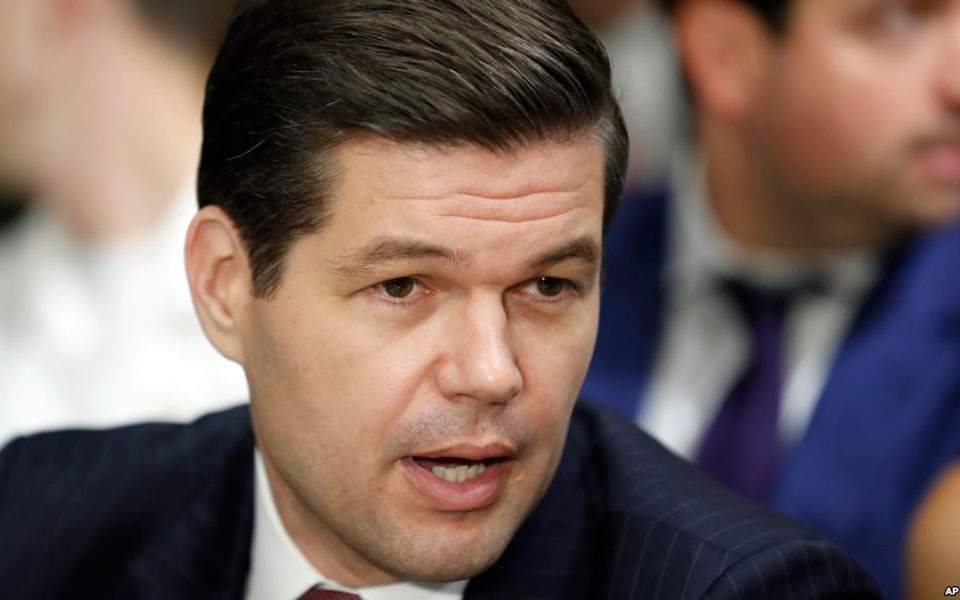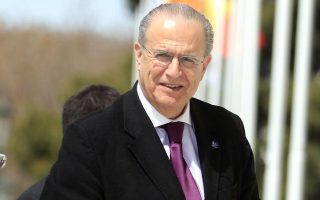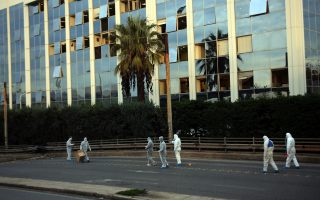Wess Mitchell sends clear message to Turkey over Cyprus

US Assistant Secretary of State for European and Eurasian Affairs Wess Mitchell sent a clear message to Ankara not to obstruct drilling for hydrocarbons that is under way in Cyprus’s exclusive economic zone (EEZ), while hailing Greece as a “fantastic ally” to the United States in the region, in an exclusive interview with Kathimerini’s Sunday edition.
Mitchell said Turkey's view on Cyprus's EEZ is “a minority of one versus the rest of the world,” as international law stipulates that the island nation can use its resources in an equitable way.
Speaking to Kathimerini a day after the inaugural session of the US-Greece Strategic Dialogue in Washington, he said the US regards Greece, Cyprus and Israel as natural allies in the Eastern Mediterranean and described Greece as a “one of the most military capable allies.”
As for the contentious Prespes name deal between Greece and the Former Yugoslav Republic of Macedonia, Mitchell said Washington supports the accord, noting that its enforcement could increase Greece’s economically dominant role in the Balkans.
What will the US-Greek Strategic Dialogue bring to US-Greek relations in a concrete way?
I think two big things. First of all it’s a platform, the most senior, deepest and widest platform we’ve ever had in US-Greek relations, to talk about our shared interests and pursue them. It’s a vehicle we will not be using once, but we will keep on using it in the future. And it really shows the level of US strategic commitment to Greece as an ally. And, secondly, there were a range of specific next steps and actions concretely that the group either agreed to or agreed to flesh out in these various pillars. Strategic dialogue is based on six pillars, trade/investment, people-to-people ties, regional cooperation, security and defense, energy and law enforcement/counterterrorism. In each of those buckets we talked about some things that we can do together, a more intense cooperation than the one we had in the past.
Defense is the most enduring pillar of US-Greek strategic relations. How do you see it developing from now on? Also, do you see a new multi-year agreement regarding Souda Bay? A closer cooperation in other fields like technology? And are any thoughts on the US side about including Greece in a bigger Foreign Military Sales (FMS) program?
We already have a very robust, decades-long cooperation with Greece. Greece is a fantastic ally. It supports US missions across the region. I think you know Operation Atlantic Resolve, the drones that operate out of various parts of Greece. Obviously Larissa and Souda Bay figure very prominently for us and also I have to say that our Greek allies have contributed significantly to US and NATO operations in a lot of bad places. We're looking at some pragmatic areas where we could increase US-Greek coordination. I don’t want to get too far ahead of process on some of the technical things you’ve mentioned. I’ll just say that I think there is a political will first and foremost for both Greece and the US to build on our existing cooperation. And, number two, Greek geography is something that allows Greece and the US to have a security and defense cooperation that’s really unique in that region. Souda Bay has a depth to it that makes it a very special kind of port. Greece’s location allows us to support power projection across the Eastern Mediterranean.
In that respect, I'd like to refer to the statement of Secretary of State Mike Pompeo, right after the US-Greek Strategic Dialogue. He mentioned Greece but also Israel and the Republic of Cyprus. And I was wondering if his comments are indicative of the role the US is proposing to play in that context.
Yes it is. These are three very special countries for the US because they are stable, democratic, Western allies in a region where you don’t find a very large number of stable, democratic partners. And it’s a natural step for the US to deepen cooperation with all three in the existing pattern of cooperation between Greece, Israel and Cyprus. As part of our Eastern Mediterranean strategy we want to strengthen the US role in that region and the most natural way to do this is to increase our formal participation in that format and we are looking for ways to do that next year. There are a lot of things we can explore with those three countries. It’s not exclusive to anyone, it’s not aimed at anyone. Why it’s important is because it’s a natural way to increase our energy security cooperation. As you know the Eastern Mediterranean is resource-rich and we want to see that add to European energy diversification. Secondly, we have a lot in common in security policy with those three countries, we kind of share strategic perspective. And, number three, it’s a way to place a check on, for example, Iranian efforts to develop a window on to the Mediterranean through Syria. You have increased Russian and Chinese activity there. So, it’s not construed as a counterpoise to anyone, but it’s a practical means of increasing cooperation with like-minded states.
Regarding this general idea of “frontier states,” I was wondering if Greece, somehow, is included in this periphery of countries that could become more crucial for US security worldwide.
I think very much that’s the case for Greece. As I’ve just mentioned, you are a stable, democratic ally. The resilience that Greece has shown in bouncing back from the economic crisis with US support. You are one of the most militarily capable allies of the US. If you started in Poland and went south – probably 1,500 miles – between Poland and the next most capable military, let’s say Israel, Greece would be a very natural center of gravity. I think Greece figures a lot more prominently in US strategic thinking because of the range of threats against the West, and those are threats to Greece. Greece feels the heat from threats much earlier than other states because of your geographic placement. And I think your leaders have shown a real sensible, strong but flexible approach to dealing with those threats.
Let me move on to the Thessaloniki International Fair. It has been mentioned many times by US officials. And I’d like to ask what is the investment part of the US-Greek Strategic Dialogue. Do you see American investments in Greece in the near future?
The idea of Thessaloniki was to begin the process of a marriage between something that the US is very good at, which is capital, but also innovation and IT, and combine that with something that Greece is very good at, which is your intellectual and creative power. Your people are a tremendous resource, your startups. So we see a “win-win.” We want to highlight the advantages of Greece to American innovators and investors.
As I understand, your government is transitioning to another economic model, after you bounced back from the crisis, whereby you base your growth less in a sort of debt-ridden consumption, more on the advantage of your geography. I think that for the US to be part of that makes a lot of sense for Greece. What we talked about yesterday, as a next step, we want to make sure it’s not just empty words. So Ambassador Geoffrey Pyatt and his team have been working with the Hellenic-American Chamber of Commerce on a follow-on that would sustain the momentum, so some specific action items. We are very engaged with the Greek government but also with companies and investors to point them towards Greece and all its natural advantages.
When you speak of transitioning from a debt-ridden consumption to a different kind of growth, is it about innovation, technology and energy?
That’s right. Which is more, as I understand it, to leverage your geography. Because you are the crossroads, the same strategic frontier that presents you with strategic security challenges also presents you with natural economic opportunities. Of course that makes you interesting for other players like China.
Greece has long-standing disputes with Turkey. Also, in a period when Washington and Ankara are going through a turbulent phase, could Greece substitute part of the role that Turkey plays in the region as a security provider?
I would answer that in two ways. First, I would acknowledge that the US-Turkish relation is vexing but crucial. The role that Turkey plays in the Middle East in supporting our efforts against DAESH and the placement of Incirlik, our law enforcement cooperation as a NATO ally. It’s really indispensable. But it is a difficult relationship, we’re navigating through some shoals, from pastor Andrew Brunson, who we are very happy to see released, and of course we have been pressing the Turks to not buy S-400 [Russian military systems]. We are working to construct a modus vivendi, a way of interacting with the Turks in Northeast Syria. And then the second thing I would say is that Greece has a strategic role to play and I would not articulate that as something that is meant to be a backstop, a replacement to Turkey. It’s enough, I think, to say that the range of possibilities for US-Greek cooperation is underdeveloped and deserve better elaboration both from the standpoint of your interests and ours.
ExxonMobil is currently drilling in the Cyprus EEZ, in addition to companies from other countries, like Total, ENI and Qatar Petroleum. Turkey claims that these drillings are illegal and it blocked a company from drilling in Block 3 last February. Do these procedures, moves from the Turkish side, create constant frictions that block natural resources exploitation in the East Mediterranean? Do they jeopardize drillings?
Well, it is something that we watch and we're taking very seriously. Our line has been consistent. Cyprus is a sovereign country. And just like any other sovereign country it has resources and it can develop those resources. We hope that the Cyprus government will do that in a way that is equitable, brings everybody on board, but ultimately that is the decision for Cyprus, its leaders and its people. There really is not a debate to be had about that. We know Turkey's view and Turkey's view is a minority of one versus the rest of the world. The rest of the world has a clear straightforward view that the exclusive economic zone of Cyprus is grounded in international law. How the Cypriots choose to go about that… we hope they'll include everyone, but we don’t want to see the development of those resources become an impediment to the political process on the island. But as I said, that’s ultimately a decision for the Cypriots.
The appropriate US role on this is to message very clearly to everyone, including the Turks, most particularly, what I’ve just said, but also that we would not take a friendly view in any kind of harassment in Cyprus waters, especially when US ships are involved – we saw the incident with ENI, so we do watch these things very carefully. I think we have been clear in our messaging to the Turkish government. I have to say we've been pleased to see the latest Turkish moves have not been the kind of aggressive activities that we saw earlier in the year.
And there is another reason why all of this is important and it has nothing to do with the Eastern Mediterranean. There are other places in the world where sovereign countries want to develop their resources. You may be familiar with some of the moves that the People's Republic of China has made vis-a-vis the development of gas reserves off the coast of the Philippines and some other places. So to us it is important intrinsically what’s happening in Cyprus, the resources there. But it's also instrumentally important for creating the right kind of demonstration effect that lets others in the world know that sovereignty matters. International law matters. And it’s not in anyone's interest to see disputes or conflicts over those resources.
Is energy an additional reason to move forward with the Cyprus talks on the political problem? Also, there has been a discussion in Greece over whether NATO could play a role, direct or indirect, in the direction of reuniting the island. I think that discourse mainly concerns whether NATO could provide the guarantees that some sides on the table require.
Let me just gain altitude on both of those questions and say that what we are trying to do in Cyprus is view Cyprus as a Western state in a vulnerable strategic region that needs engagement from the West, needs engagement from the US, from others in the Western world, diplomatically, strategically, commercially. Because if we don’t engage, others will. And those gaps do get filled. I think that relationship with Cyprus very much needs to be cultivated and the US is doing a much better job than the one we did in the recent past of embracing Cyprus along those lines. Of course we stay committed to the effort to create a bizonal-bicommunal federation, but I think the key point here is that those efforts have been going on for decades and we can’t hold up the natural process of engaging with Cyprus as a state and as a partner from now on and kind of hold our breath for other efforts on the island to bear fruit. So you may have seen Cyprus Foreign Minister Nikos Christodoulides has been here recently and we agreed on a Statement of Intent, showing that we are deepening our cooperation in security, counterterrorism, political cooperation etc. That’s fundamentally important, it sends a signal to a lot of other players in the region that we take Cyprus seriously and are trying to deepen our engagement there.
Let me sum up with the Prespes agreement. Do you believe that the agreement has played a substantial part, first of all, in making the Strategic Dialogue possible, in strengthening US-Greek relations, and at the same time strengthening stability in the Balkans? I am mainly asking because in Greece there is a political discourse about Prespes agreement.
We view Prespes as an undertaking by two friends of the US, Greece and Macedonia – you will permit me to say that because we are in the US. We view it as an undertaking that two democratically elected governments decided to embark upon. We have been supportive. But our appropriate role is not to write this agreement, is not to seal this agreement. But once the governments have embarked upon it, and they are showing the will, and I think the peoples are showing the will to stabilize the region and see the Balkans moving towards the West, of course we are going to be in a supportive posture as that moves forward.
I think on the Greek side of the equation in this agreement has shown us two things. First, it validated to us really what is the investment thesis of our overall strategy in Greece, that Greece is a leader and it has potential to export stability. So it took leadership to face this criticism at home and elsewhere and broker an agreement to a very, very difficult problem that has defied a solution for a very long time. Secondly it showed us a kind of nuance of creativity on the part of Greek diplomacy, beginning first and foremost with then foreign minister Nikos Kotzias’s effort. I think it has to be acknowledged the role he played in this process.
We will leave it to Greeks and Macedonians to decide the fate of this agreement, debate its various merits on certain issues but we are supportive to what we understand to be the role here and that is to clear out the friction points between these countries so that Macedonia can move towards the West. In doing that, the outcome will be good for Greece because you can only face the challenges on your southern frontier, your maritime frontier in Greece, and really develop resources and attention there and prioritize that if the region to your north is stable. Stable Balkans are good for Greece for so many reasons, but one that’s often not talked about is economic reasons. Historically the places like Macedonia to your north have been a natural extension of the Greek economic hinterland. And that connects with what we were talking about earlier with Thessaloniki. There are a number of countries in the Balkans that follow very unnatural supply lines to deep-water ports in the Adriatic Sea for importing-exporting. And with the resolution of the name issue they will be looking towards Greek ports. And you would see a measurable increase in Greek regional economic leadership and all the activities that come with that. And that’s something we want to encourage as well.





